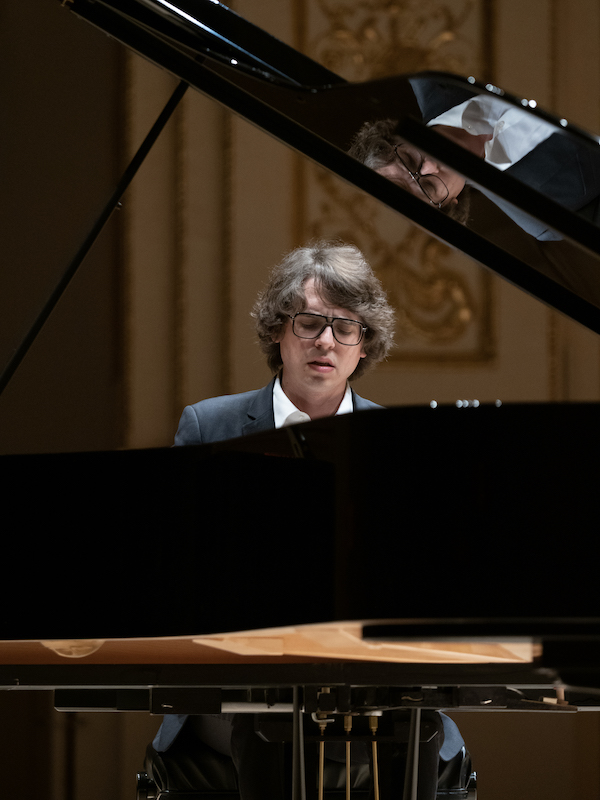Pianist Debargue shows world-class skills in Carnegie recital
Judging from his recital Saturday night at Carnegie Hall, Lucas Debargue is not a very accomplished pianist.
He is a transcendently accomplished pianist.
So much about Debargue—the shy platform manner, the bountiful imagination, and the utter disregard for technical difficulty as he pursued his expressive goals—reminded this writer of the first time he heard Daniil Trifonov play, in a 200-seat hall in Cambridge, Massachusetts, a decade ago.
One had a feeling then that the young Russian was going places, and the same feeling was inescapable Saturday as Debargue brought uncommon color, nuance, and at times volcanic power to music of Scarlatti, Ravel, Chopin and Liszt.
And in fact the French pianist has been a few “places” already, earning the music critics’ award at the Tchaikovsky International Piano Competition in 2015 and recording several well-received albums for the Sony Classical label.
Saturday evening’s repertoire, and Debargue’s professed interest in composers such as Szymanowski and Medtner, reflected his Russian pedagogical heritage as a pupil of Rena Shereshevskaya. The recital was presented by Cherry Orchard Festival and Show One Productions, two arts firms headed by Russian emigrées. One overheard much Russian being spoken in Carnegie’s crowded aisles Saturday.
The volatile imagination of Domenico Scarlatti, with its Spanish influences and hand-crossing keyboard legerdemain, brought freewheeling playing from the pianist in the dreamy sonata in A major, K. 208; the flamenco-style A major, K. 24; the stately D major, K. 491; and the whirling D minor, K. 141.
Scarlatti’s two-part form with each section repeated offered ample opportunities to view the music in a different light the second time around, which Debargue did so imaginatively it almost sounded like a different piece. He unfortunately omitted all but one of the second-section repeats, presumably so the piece wouldn’t seem to end twice, although with his keen sense of nuance and timing he could have easily avoided that problem.
Debargue began Ravel’s poetic and virtuosic Gaspard de la nuit with a seemingly noteless undulation in “Ondine,” but soon enough the waves were freely surging over and under the water spirit’s pleading, seductive song. The pianist’s tonal palette made palpable both the depth of the water and the sparkle of its surface.
He limned the lonely, desolate landscape of “Le gibet” in finely voiced chords over a darkly tolling low B flat. As for the demonic closing movement “Scarbo,” pianists talk about it as perhaps the severest test of their technique in repeated notes, leaps and arpeggios, but in Debargue’s performance one was mainly aware of gorgeously shaped lines and of music seeming to pour effortlessly out of the instrument. The gremlin’s grotesque portrait was painted in volcanic jets, spurts and spatters.
Opening the second half with Chopin might seem a conventional choice, but Debargue selected three of the Polish master’s most challenging works to interpret coherently: the Ballade No. 2 in F major, with its stark contrasts of pastoral calm and violent fury; the ambling Prelude in C-sharp minor, Op. 45; and the discursive Polonaise-Fantaisie in A-flat major.
Questionable choices in the Ballade favored subjectivity over structure: the placid 6/8 meter of the opening seemed overloaded with rubato, and the interrupting Presto con fuoco became a tempo-less avalanche of notes. As a result, pacing and dramatic impact suffered in ways they didn’t elsewhere in Saturday’s program.
In Debargue’s performance, Chopin’s lone prelude outside the celebrated Opus 28 set gave the impression of a sensitive singer improvising over a gently rolling accompaniment, steering this way and that at will.
It made, in fact, a suitable prelude to the much broader wanderings of the Polonaise-Fantaisie, a long piece with few structural signposts, in which success depends on the pianist’s ability to go with the flow of Chopin’s volatile inspiration. On Saturday, from the suspense of its opening call to the heedless ecstasy of its last pages, this most unbuttoned of Chopin pieces flowed dynamically from tune to tune and from mood to mood.
And speaking of preludes to larger works, Liszt’s “Après une lecture du Dante” (After Reading Dante)—the last piece in the set Années de pèlerinage, deuxième année: Italie—threw all the resources of the piano at a vision of heaven and hell, much as the composer would later in his mighty Sonata in B minor. (Liszt subtitled the piece Fantasia quasi sonata, and musicians commonly call it simply the “Dante Sonata”—generally in tones of awe.)
Debargue’s sense of dramatic timing and flow shone everywhere, driving the dire initial summons forward, dragging with the moaning chorus of the damned, sparkling with the vision of the beloved Beatrice, spouting hellfire while laughing at superhuman technical challenges, and keeping musical shape and purpose in mind the entire time.
The pianist responded to the standing ovation with two encores: Scarlatti’s dancing, Spanish-tinted Sonata in D minor, K. 52, and his own composition, a Toccata that started light and Schumannesque, and then got, let’s just say, bigger.
Pianist Cristiana Pegoraro plays and discusses music by Vivaldi, Beethoven, Chopin, Rossini and herself, 8 p.m. Nov. 16 at Weill Recital Hall, Carnegie Hall. carnegiehall.org.

Posted Nov 07, 2022 at 7:28 am by John Feole
Wonderful. I don’t know what is more impressive, the skill of the subject of this article or the depth of knowledge and inspired writing of the author. Bravo! Bravo!
Posted Nov 12, 2022 at 1:57 am by Nancy Cloonan
Did not attend this concert but thoroughly enjoyed this outstanding review by David Wright. What a talented writer! I had not been familiar with this pianist but heartily agree with his impression of Daniil Trifonov from a decade ago. Trifonov never fails to “wow” and I look forward to being wowed by Debargue…